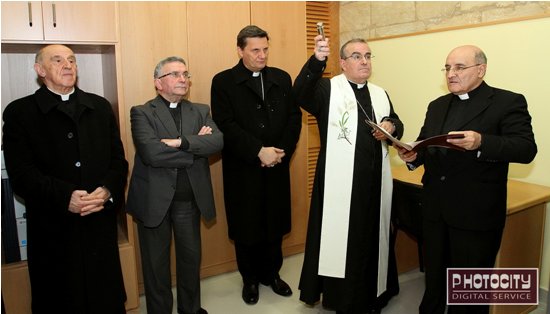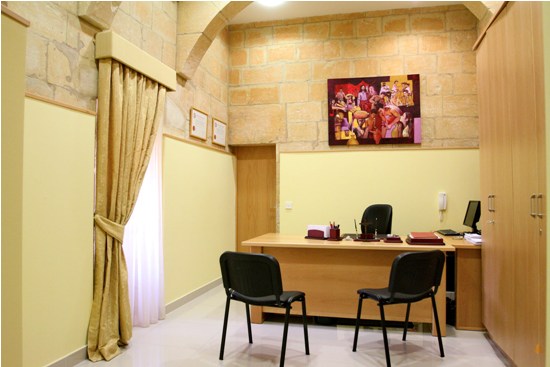On Friday,11th February 2011, Archbishop Paul Cremona O.P. inaugurated and blessed the new offices of the Regional Tribunal of Second Instance, at the Archbishop’s Palace, Valletta.
During his welcome address, Mgr. Joseph Bajada, Judicial Vicar of the Regional Tribunal of Second Instance said that the transformation of these former dilapidated rooms into a warm and welcoming environment, will help those who seek assistance feel more welcome.
Mgr. Bajada explained that the idea to provide a warm and welcoming environment by a Church Institution is not just a cliché…it is an obligation, especially when dealing with people who are suffering. This obligation, he said, must be grounded in Christ’s encouraging invitation in the Matthean Gospel Narrative: “Come to me, all you who are weary and burdened, and I will give you rest (Mt 11:28).” Mgr Bajada stressed that these words should be and must always remain the driving force behind our Tribunal ministry, notwithstanding all our shortcomings and limitations.
According to Mgr Bajada, it is very opportune to glean some reflections from various Papal Allocutions to the Roman Rota. In his Address last January, the Holy Father told the members of the Rota: “This moment offers me an opportunity to express once again my appreciation of the work you are carrying out in the service of the Church and to encourage you to an ever greater commitment in such a delicate and important sector for pastoral care and for the salus animarum”. Such words cannot but apply to everyone who is involved in some way or another in tribunal ministry. In another Allocution, precisely in 1990, the Venerable Pope John Paul II likewise offered his guidance when he said: “The juridical and the pastoral dimensions are united inseparably in the Church, a pilgrim on this earth. Above all, one aspect of their harmony emerges from their common goal: the salvation of souls”. It should therefore do well to recall Pope Benedict’s words to the Rota in 2007, when he stated that “the law is truly interwoven with life and love as one of the intrinsic obligations of its existence.”
Mgr Bajada explained how in the Tribunal milieu, the words which the present Pope applied to the pre-matrimonial enquiry can be appropriated. He says: “…juridical does not mean formal, as though it were a bureaucratic step, like filling up a form based on set questions. Instead it is a unique pastoral opportunity – one to be made the most of with the full seriousness and attention that it requires – in which, through a dialogue full of respect and cordiality, the pastor seeks to help the person to face seriously the truth about himself or herself and about his or her own human and Christian vocation for marriage. In this sense the dialogue … requires an atmosphere of full sincerity”.
In concluding, Mgr Bajada expressed his heartfelt wish to all those who are in some way or another involved in Tribunal ministry – to uphold the truth in love. For as Benedict so clearly stated in January 2010: “Charity ‘rejoices in the truth’ (1 Cor 13:6)” “Only in truth does charity shine forth, only in truth can charity be authentically lived… Without truth, charity degenerates into sentimentality. Love becomes an empty shell, to be filled in an arbitrary way. In a culture without truth, this is the fatal risk facing love. It falls prey to contingent subjective emotions and opinions, the word ‘love’ is abused and distorted, to the point where it comes to mean the opposite”.
Click on the photo to enlarge. The photos of the Archbishop’s events may be purchased from PHOTOCITY, Valletta. Tel: 21236723. Email: [email protected]






